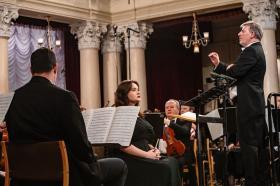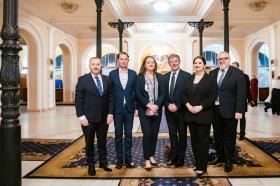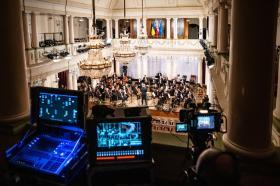The event, organised by Temida Arts & Business Foundation—where Paweł serves as Board Chair—was held in collaboration with the Polish Ministry of Foreign Affairs, the Polish Institute in Kyiv, and the Polish Embassy in Kyiv. It marked Poland’s assumption of the presidency of the Council of the European Union in January of this year.
The program featured works deeply intertwined with themes of history, resilience, and cultural identity. The concert opened with music composed by Maxim Berezovsky, a pioneering figure in Ukrainian classical music. One of the highlights of the evening was the stirring performance of Symphony of Sorrowful Songs by Henryk Mikołaj Górecki, a composition which topped the British music charts 30 years ago, commemorating victims of the Second World War, and which is centered on themes of motherhood and loss. The symphony’s three movements each featured a solo soprano delivering poignant Polish texts: a fifteenth-century lament of Mary, mother of Jesus; a message inscribed on a Gestapo cell wall during World War II; and a folk song depicting a mother’s sorrow as she searches for her son lost in the Silesian uprisings.
The concert concluded with Katyń Epitaph by Andrzej Panufnik, a composer who defected from Communist Poland in 1954. This work was devoted to the memory of the 15,000 Polish prisoners-of-war who were brutally killed in the Katyń Forest in Russia in 1940. Panufnik’s music, which was banned in his homeland for more than three decades, resonated powerfully in a concert dedicated to freedom and solidarity.
For those who missed the live performance, a recording is available online via the link below.
Looking ahead, Paweł is set to oversee the organisation and delivery of a major classical music festival in Bielsko-Biała, which will become Poland’s first-ever Capital of Culture in 2026.





